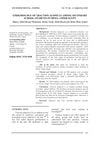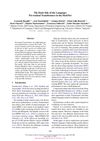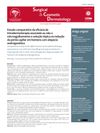
Herbal remedies might help with hair loss but need more research for safety and effectiveness.
 February 2024 in “Journal of Health Science and Medical Therapy”
February 2024 in “Journal of Health Science and Medical Therapy” ADAM17 could be a potential target for treating PCOS.
 January 2024 in “La Ciencia al Servicio de la Salud y Nutrición”
January 2024 in “La Ciencia al Servicio de la Salud y Nutrición” Spironolactone is effective and safe for treating hair loss, excessive hair growth, and acne.
 December 2023 in “International journal of multidisciplinary research and analysis”
December 2023 in “International journal of multidisciplinary research and analysis” SH-MSCs gel reduced IL-6 and increased TGF-β, suggesting it could treat alopecia.
 November 2023 in “Frontiers in cell and developmental biology”
November 2023 in “Frontiers in cell and developmental biology” Hair aging is caused by stress, hormones, inflammation, and DNA damage affecting hair growth and color.
 November 2023 in “Klìtinna ta organna transplantologìâ”
November 2023 in “Klìtinna ta organna transplantologìâ” MSC-derived exosomes can help treat COVID-19, hair loss, skin aging, and arthritis.
 October 2023 in “Han'gug miyong haghoeji/Journal of the Korean society of cosmetology”
October 2023 in “Han'gug miyong haghoeji/Journal of the Korean society of cosmetology” Understanding psychological discomfort in hair loss can improve treatment outcomes.
 October 2023 in “Benha Journal of Applied Sciences”
October 2023 in “Benha Journal of Applied Sciences” Methotrexate and vitamin D3 are potentially more effective and safer than triamcinolone for treating localized alopecia areata.
 October 2023 in “International journal of biology, pharmacy and allied sciences”
October 2023 in “International journal of biology, pharmacy and allied sciences” Personalized treatment plans combining natural and synthetic approaches are important for managing alopecia effectively.
 October 2023 in “Frontiers in medicine”
October 2023 in “Frontiers in medicine” Targeted immunotherapy could be a promising new treatment for hair regrowth.
 September 2023 in “International journal of biomedicine”
September 2023 in “International journal of biomedicine” Minoxidil might help treat acne scars by reducing collagen buildup.
 September 2023 in “Ain Shams medical journal”
September 2023 in “Ain Shams medical journal” 31% of female high school students in Minia have hair loss from tight hairstyles, which can become permanent if not treated early.
 July 2023 in “The Egyptian Journal of Hospital Medicine ”
July 2023 in “The Egyptian Journal of Hospital Medicine ” The conclusion is that emotional support and a variety of treatments are important for alopecia areata, but more research is needed.

Pre-trained Transformers need extreme retraining to perform well on DarkNet data.
 January 2023 in “Postępy Dermatologii i Alergologii”
January 2023 in “Postępy Dermatologii i Alergologii” Stem cells can improve wound healing, reduce scars, promote hair growth, rejuvenate skin, and enhance fat grafts in plastic surgery, but there are still some concerns.
 January 2023 in “Surgical & Cosmetic Dermatology”
January 2023 in “Surgical & Cosmetic Dermatology” Combining intradermotherapy with microneedling and a topical solution reduces hair loss more effectively than intradermotherapy alone.
 December 2022 in “Journal of applied biological chemistry”
December 2022 in “Journal of applied biological chemistry” Betula platyphylla extract, particularly the H3-2 fraction, may help treat hair loss by promoting cell growth and inhibiting a hair loss-related enzyme.
 November 2022 in “CARDIOMETRY”
November 2022 in “CARDIOMETRY” A group has developed therapies that show promise for treating cancer and various other conditions.
 November 2022 in “Journal of Education, Health and Sport”
November 2022 in “Journal of Education, Health and Sport” The skin's bacteria might influence the development of a hair loss condition called alopecia areata.
 December 2021 in “Biomedical journal of scientific & technical research”
December 2021 in “Biomedical journal of scientific & technical research” Oral processed egg yolk improves hair regrowth and quality in alopecia patients.

People with Down syndrome have a higher risk of skin disorders and need better screening and treatment.
 February 2021 in “Journal of pharmaceutical and biological sciences”
February 2021 in “Journal of pharmaceutical and biological sciences” No cure exists for alopecia areata, and treatments are personalized.
 June 2020 in “Journal of Dermatological Treatment”
June 2020 in “Journal of Dermatological Treatment” Use telemedicine and strict hygiene for safe hair and scalp treatments during COVID-19.
 January 2020 in “Elsevier eBooks”
January 2020 in “Elsevier eBooks” Plant-based chemicals may help hair growth and prevent hair loss but need more research to compete with current treatments.

Optical Coherence Tomography has potential in diagnosing hair loss and monitoring blood clotting, and could be improved for deeper tissue observation and better hair loss understanding.
 October 2018 in “Journal of the European Academy of Dermatology and Venereology”
October 2018 in “Journal of the European Academy of Dermatology and Venereology” 
New treatments for hair loss show promise, including plasma, stem cells, and hair-stimulating complexes, but more research is needed to fully understand them.
 April 2018 in “Journal of Investigative Dermatology”
April 2018 in “Journal of Investigative Dermatology” Hydroxychloroquine may cause false results in tuberculosis tests for patients with autoimmune skin diseases.
 April 2018 in “Journal of Investigative Dermatology”
April 2018 in “Journal of Investigative Dermatology” Skin disease activity scores can help decide when skin symptoms no longer affect the quality of life in patients with mild dermatomyositis.
 April 2018 in “Journal of Investigative Dermatology”
April 2018 in “Journal of Investigative Dermatology” Psoriasis patients are willing to pay less than the cost of biologic treatments for remission and don't expect complete or long-term symptom clearance.






























